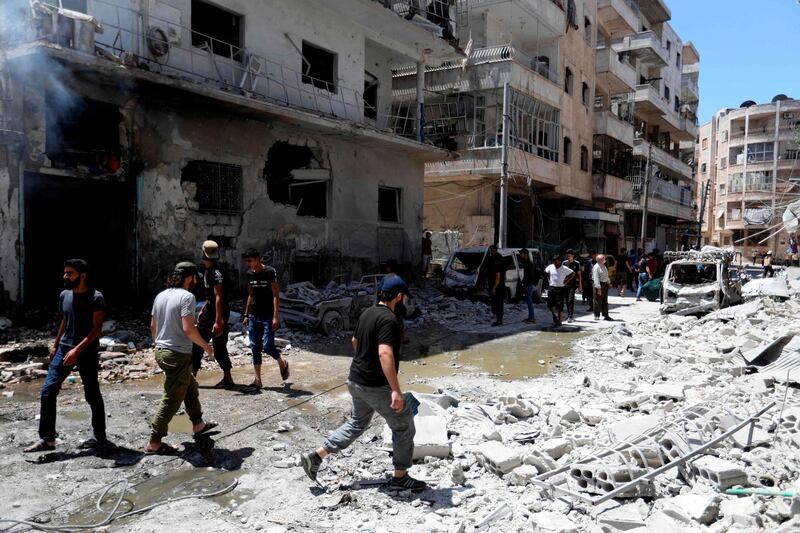Russian and regime air strikes had intensified in civilian areas of the last bastion of opposition to Syrian President Bashar Al Assad as a UN official condemned world leaders for ignoring attacks on such targets.
The regime assault on Idlib was launched three months ago and threatens to create a humanitarian crisis in a region home to about three million people.
“This is the heaviest bombing and loss of life since the start of the campaign,” said Fadel Abdul Ghany, chairman of the Syrian Network for Human Rights.
The UN and Human Rights Watch said schools and medical centres had been targets since the assault began.
Mark Lowcock, the UN’s co-ordinator of humanitarian affairs, repeated the criticism of the UN Security Council by the High Commissioner for Human Rights, Michelle Bachelet.
“You have ignored all the previous pleas you have heard," Mr Lowcock said in New York.
"You know what is happening and you have done nothing for 90 days as the carnage continues in front of your eyes.
“Are you again going to shrug your shoulders, as Michelle Bachelet said? Or are you going to listen to the children of Idlib and do something about it?”
Since April, the regime offensive against rebel groups in Idlib has killed at least 400 people, including 90 children, Save the Children said.
The Syrian Network for Human Rights said at least 62 people were killed across Idlib since last week.
“They are taking revenge on our popular support that has stood by us,” said Naji Mustafa, spokesman for the National Liberation Front, a coalition of militias backed by Turkey in Syria.
Mr Mustafa called the raids “systematic terror by Assad gangs and Russian forces”.
Analysis of satellite imagery over the past three months showed that at least 17 villages had been completely destroyed, Mr Lowcock said.
“What you see is a level of destruction consistent with a bombing campaign aimed at a scorched-earth policy,” he said of Kafr Nabutha, a town in southern Idlib where buildings were flattened.
Information on air attacks will be passed on to the Commission of Inquiry on Syria, which is collecting evidence for war crimes charges, Mr Lowcock told the council.
The regime’s assault on Idlib, bolstered by Russian air power and Iran-backed troops, is likely to be the battle in Syria’s eight-year conflict.
Mr Al Assad is clawing back territory after peaceful protests in 2011 increased into a fierce civil war in which he lost much of the country to militias and armed opposition groups.
More than 400,000 people have died since 2011, the World Bank says, while nearly seven million have been displaced in the fighting.
The assault on Idlib has displaced at least 400,000 people.
Russia’s intervention in the conflict in September 2015 came at a critical moment for Damascus and effectively turned the tide of the conflict.
Moscow has said that the campaign in Idlib is aimed at removing Hayat Tahrir Al Sham, an Al Qaeda-linked group that controls most of the north-western province.
Rebel commanders this month said that Russia had again come to the aid of Mr Al Assad’s forces after troops failed to capture strategic positions.
The National Liberation Front said that Russian special forces had been sent into combat, a claim Russia’s Defence Ministry denied.
Russia has minimised its casualties by sending few combat troops but employing private military groups.
Recent reports in Russia's investigative newspaper Novaya Gazeta that three Russian mercenaries were killed in Syria last month has drawn attention to hired soldiers in the country.
There is growing frustration among advocacy groups and international observers over the international community’s failure to hold Syria and Russia accountable for the events in Idlib.
Ms Bachelet lamented the "apparent international indifference" to mounting civilian casualties last week.
"This latest relentless campaign of air strikes by the government and its allies has continued to hit medical facilities, schools and other civilian infrastructure such as markets and bakeries," she said.






